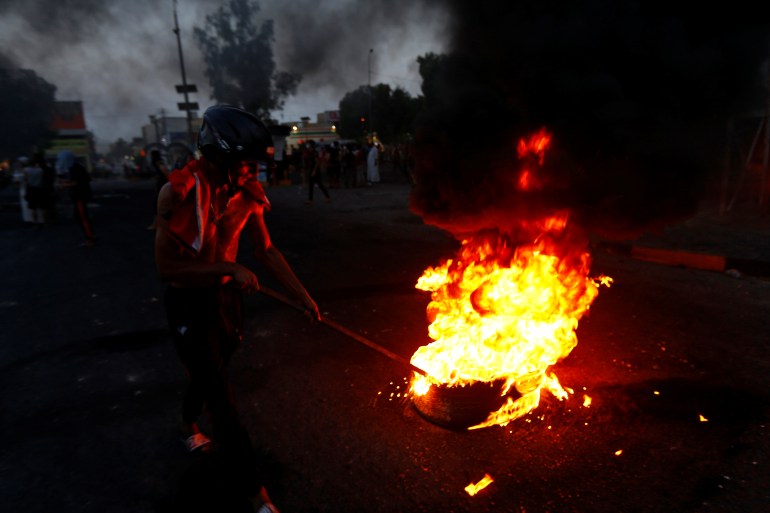Protest demonstrations resumed today, Monday, in the capital, Baghdad, and other Iraqi cities, to demand an improvement in the electrical energy situation, after a bloody night in which two demonstrators were killed after clashes with riot police in Tahrir Square in central Baghdad, which recalls the violence that protesters were subjected to last October. While the street waits for the new government, "retribution" from the perpetrators.
The demonstrators closed a number of roads and bridges and burned tires in the streets, causing confusion and traffic congestion.
In Dhi Qar Governorate, in the south of the country, local sources said that dozens of protesters gathered in front of power stations, north of the city of Nasiriyah, the center of the province, to demand an increase in their regions' share of electrical energy.
The sources indicated that the protesters demanded an improvement in the level of electricity in their areas. The cities of Dhi Qar Governorate are witnessing for the tenth day, demonstrations demanding the dismissal of what protesters describe as corrupt officials, and the improvement of the living conditions of citizens.
Investigation
Meanwhile, Prime Minister Mustafa Al-Kazemi said that the security forces do not have the right to fire on the demonstrators, and demanded an investigation into what happened in Tahrir Square, and its completion within 3 days.
This came hours after the funeral of the two dead demonstrators in Tahrir Square (central Baghdad) yesterday night in an atmosphere of sadness and anger.
The demonstrators fell and others were seriously injured after the Iraqi security forces used force and tear gas to end the closure of dozens of demonstrators in the Tahrir and Al-Khulani areas in central Baghdad.
Iraqis have posted videos of their accounts of the security forces and the events of last night, while the protesters narrated the details of the events, expressing their surprise at the excessive repression of a normal peaceful escalation.
And demonstrations took place last night in Baghdad's Tahrir Square and several southern provinces. Protest against power outages for long times, at a time when the temperature exceeds 50 degrees.
In Tahrir Square, the demonstrators chanted slogans condemning the deterioration of services, and demanded that the corrupt be referred to the judiciary, and they also called on Prime Minister Mustafa Al-Kazemi to solve the problem of the power cuts that Iraq has suffered for many years during the summer, especially.
In exchange for accusations by the authorities of suppressing the demonstrators, the spokesman for the commander-in-chief of the Iraqi armed forces, Yahya Rasoul, said Monday that the security forces have clear and strict directives against any demonstrator, and if he tries to provoke them, accusing parties - he did not specify - of trying to drag the security forces to the confrontation.
For its part, the High Commissioner for Human Rights in Iraq said that the clashes that took place last night in Tahrir Square are a flagrant violation of human rights and United Nations law enforcement standards and a violation of the rights of peaceful protest.
The Commission called on the security forces to focus on protecting the demonstrators, and to prevent the use of any excessive violence against them, and also called on the government to respond to the demands of peaceful protesters throughout the provinces of Iraq.
UN condemnation
In Baghdad, too, the United Nations Mission in Iraq said that Iraqis face many challenges and are living in a difficult situation because of the continued deterioration of services.
In a statement, the mission condemned the acts of violence and human losses that occurred during the protests last night in Baghdad and southern regions of the country, and demanded protection of the right to peaceful protest without restriction or condition.
The mission also welcomed what it described as the commitment of the Iraqi government to investigate to find out the circumstances of what happened and hold perpetrators accountable.
These bloody confrontations in Tahrir Square, the center of the popular uprising, are the first since Mustafa Al-Kazemi's government took office in May.
Commenting on these developments, director of the Al-Jazeera office in Baghdad, Walid Ibrahim, said that there is mounting anger, disappointment and fears prevailing in the Iraqi street, pending the official position to explain what happened in Tahrir Square.
He added that there are those who say that hidden hands are trying to embarrass the Al-Kazemi government, but the demonstrators confirm that none of them wants to repeat the cycle of violence that marred the protests last October, with the government demanding to deal rationally with the new protests demanding better services and the provision of electric energy.
On Saturday and Sunday, the protests demanded to improve electricity in the cities of southern Iraq, to denounce the power outages that the state only provides for a few hours a day, especially with temperatures exceeding 50 degrees Celsius this week.
These demonstrations are an annual summer tradition in Iraq, especially with the chronic power outages, which no government has yet been able to find a radical solution to.
Iraq had witnessed since last October a wave of widespread protests denouncing corruption, unemployment and deteriorating services, and more than 600 people were killed during these protests, which stopped last March due to the outbreak of the Corona virus.
The protests led to the resignation of Prime Minister Adel Abdul Mahdi, who replaced him in May, al-Kazemi, a former intelligence chief.

